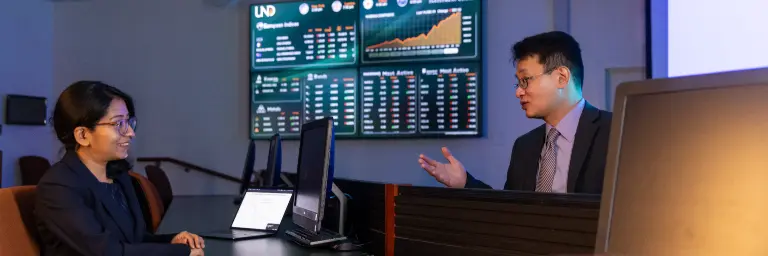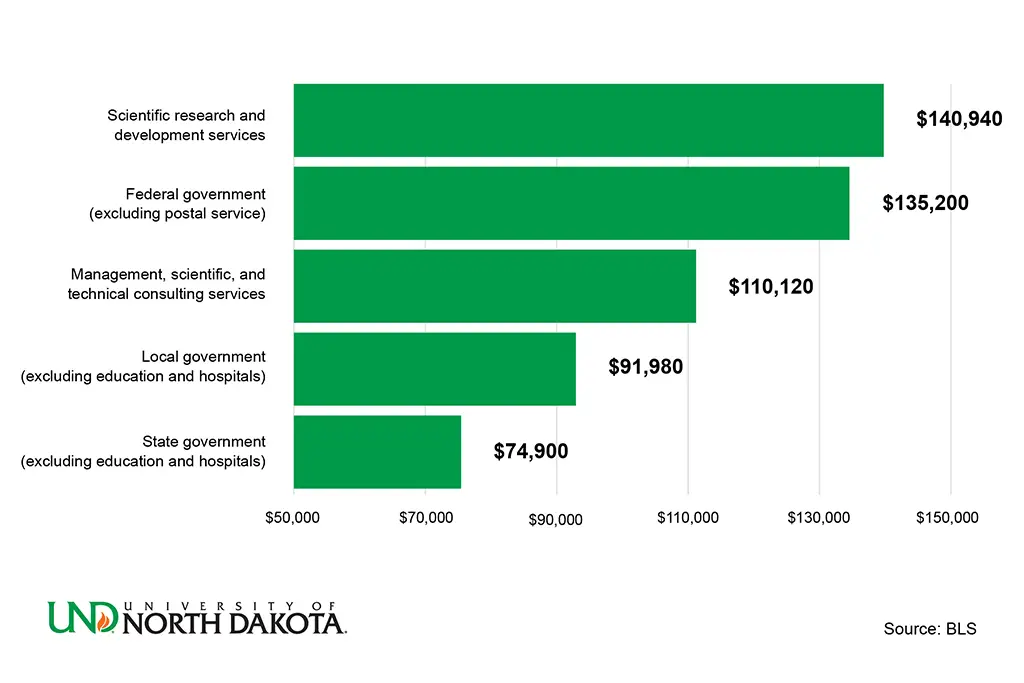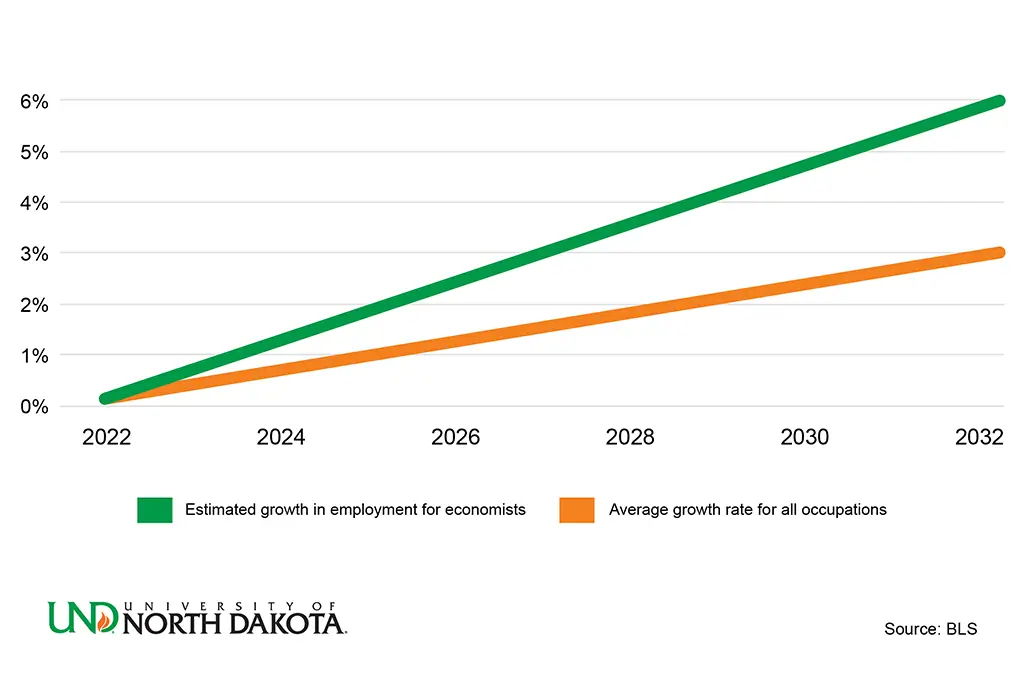
What is Applied Economics? Unlock Practical Insights
Applied economics is the practice of using economic theories to solve real-world problems.
Request Information
It focuses on applying ideas from economics to make decisions that affect businesses, governments, and everyday life.
Have you ever wondered how businesses decide what to charge for a product or how governments develop policies that impact our everyday lives? These aren't just random decisions—they're guided by something called applied economics. But what is applied economics, and why does it matter?
Whether you're a student exploring career paths, a professional looking to upskill, or simply someone curious about how things work, we offer answers. So, let's explore what applied economics means, what studying it involves, and the exciting career opportunities it offers.
What is Applied Economics?
There are two broad areas of economics: core economics and applied economics. While core economics focuses on establishing the theories and models that describe the way the economy functions, applied economics is concerned with applying these theories to deal with practical problems.
For example, experts use applied economics to set prices in a business, manage their resources, or expand into new markets. It also assists governments in making policies that affect public welfare, such as setting taxes or creating job programs.
As early as 1803, economist Jean-Baptiste Say highlighted the importance of using economic principles to guide decisions in specific situations. In the introduction to his Treatise on Political Economy, 1803, he speaks of the general principles of political economy being used "to ascertain the rule of action of any combination of circumstances presented to us."
Key Concepts in Applied Economics
Some key concepts in applied economics that help solve real-world problems include:
Opportunity Cost
Any choice that you make is at the cost of something else. So, the opportunity cost is the value of the next best alternative while making a choice. For example, time spent watching a movie means that you give up time that might have been used for studying or even working.
Knowing the opportunity cost aids in good decision-making since you consider what you are giving up.
Marginal Analysis
Marginal analysis basically means looking at the extra benefits and costs of a decision. Such an analysis is used to find the optimal level of activity rather than thinking of things in all-or-nothing terms.
For example, a firm may say, "If we produce one more unit, will the additional revenue cover the additional cost?" This way, they can make sure that decisions are made where the benefits outweigh the costs.
Elasticity
Elasticity is the degree to which one variable responds to changes in another variable. So, elasticity helps businesses and policy framers forecast how changes are going to affect markets.
A very common case from economics is price elasticity of demand—how much the quantity demanded changes when the price changes. For instance, if the price of coffee rises and people reduce their coffee consumption, the demand will be elastic. If they still buy the coffee even after the price rises, then it is an inelastic demand.
Market Efficiency
Market efficiency occurs when resources are distributed in the best way possible, ensuring no waste. No waste means that things are being used effectively.
However, markets, at times, can fail. This could be because of factors like monopoly, externality's like pollution, or asymmetry in information. In such cases, government intervention may be necessary to regulate and address the issues.
Externality's and Public Goods
Externality occurs whenever a decision affects people who have nothing to do with it. For example, pollution from a factory does impact people living around those locations.
Public goods are things like clean air or national defense that are available to everyone whether they pay for them or not. Applied economics, therefore, helps inform policy design to manage those things which markets handle poorly on their own.

Why Applied Economics Matters: Real-World Applications
The 2008 financial crisis is a striking example of how important applied economics is and how it can impact real-world events. When the housing bubble burst, it exposed flaws in the financial system. Applied economics guided the response, from bailouts to new regulations like the Dodd-Frank Act, showing its role in mitigating economic shocks.
Applied economics is used across various sectors to make informed decisions and improve outcomes, including:
- Business: Companies use applied economics to set prices, predict customer behavior, analyze markets, and plan strategies.
- Public policy: During the COVID-19 pandemic, applied economics guided decisions on lockdowns, stimulus packages, and vaccine distribution. It also informs environmental policies, such as setting carbon taxes or subsidies for renewable energy and balancing growth with sustainability.
- Healthcare: Applied economics improves the efficiency of resource allocation, pricing of medical services, and the design of insurance systems.
- Finance: It guides investment strategies, manages risk, and develops financial regulations.
- Education: It assesses the costs and benefits of different educational policies to improve access and outcomes.
- Transportation: Applied economics helps plan infrastructure projects, set pricing for public transport, and reduce congestion through policy.
Current Trends and Future Directions in Applied Economics
Like most fields nowadays, applied economics is also influenced by new technologies. Particularly, the biggest trends include the integration of artificial intelligence (AI) and big data.
AI helps analyze large datasets, improve decision-making, and boost productivity. For example, such technology can optimize supply chains, predict market trends, and even personalize consumer experiences. However, it also poses challenges like job displacement and increased inequality. Moving forward, the focus will be on balancing AI's benefits with its social impacts.
The rise of big data is also revolutionizing how economists forecast trends and shape policies. By analyzing extensive amounts of real-time data from sources like social media, financial transactions, and IoT devices, economists can make more accurate predictions.
Future trends will likely include further integration of these technologies into economic forecasting and policy-making.
Career Opportunities in Applied Economics
A background in applied economics provides valuable skills that are useful in various roles across multiple industries. Graduates with this expertise can pursue careers in fields such as::
- Economic development
- Strategic planning
- Consulting
- Financial and business analysis
- Applied research

Given its broad applicability, a degree or certificate in applied economics is incredibly valuable. This is especially true if you choose to specialize in a particular area.
For instance, Richard Bailey, mayor of Coronado, California, credits UND’s MSAE program for enhancing his skills as a policymaker. Bailey emphasizes how the program’s data analytics and critical thinking skills have empowered him to evaluate public spending proposals with greater precision.
“As a policymaker, you really need to have a background in economics to not only think critically to shape policies but also communicate these decisions to the public,” says Bailey. “The MSAE degree has made me a well-rounded policymaker thanks to these critical thinking and communication skills.”
Skills in Demand
Success in applied economics requires a strong set of skills that allow you to analyze data, interpret results, and communicate findings effectively. Some of the key skills needed include:
- Analytical thinking
- Data interpretation
- Statistical analysis
- Programming
- Research
- Communication
The University of North Dakota (UND) equips its alumni with these essential skills and more through a combination of coursework, practical experiences, and research opportunities.
For example, Aimee Young, a recent graduate, shares that the Master of Science in Applied Economics & Predictive Analytics (MSAEPA) program at UND focuses on developing highly valued skills such as analysis, Python programming, and R Studio. "It took the intuition-based training I received in my bachelor's program and combined it with practical and applicable skills I could use immediately," she says. This combination of theory and practice has made her the "analytical expert" on her team.
Nipa Akter, also a graduate, who now works as a Research Data Analyst, credits the MSAEPA program for helping her develop crucial analytical and problem-solving skills. "The data analytics expertise obtained from the courses played a significant role in landing a career at the California State Department," she says.
Kenneth Cowles, another UND alum, adds, "I can honestly say that after every course I learned something that I felt I could apply to the real world." This sentiment is echoed by Bailey, who credits UND’s MSAE program for equipping him with the analytical tools he needed to address real-world challenges in his role.
Bailey conducted an independent study project during the program, applying the skills he learned to issues his city faced. “This experience allowed me to apply the regression and statistical tools to evaluate questions that are pertinent to my career,” he shares. His research on whether a new rail line could decongest highway traffic demonstrated the practical impact of applied economics on public policy.
Salary and Job Outlook
Careers in applied economics offer strong earning potential, reflecting the high demand for professionals skilled in data analysis and economic strategy. According to the U.S. Bureau of Labor Statistics (BLS), the median annual wage for economists is $115,730. The top earners make more than $216,900 per year. So, there is plenty of room for higher earning potential.
Salaries in Leading Industries for Economists
However, salaries do vary depending on the industry:
- Scientific research and development services: $140,940
- Federal government (excluding postal service): $135,200
- Management, scientific, and technical consulting services: $110,120
- Local government (excluding education and hospitals): $91,980
- State government (excluding education and hospitals): $74,900
Projected Employment Growth Rate for Economists
The job outlook for economists is promising. Employment in this field is projected to grow by 6% from 2022 to 2032, which is faster than the average growth rate for all occupations, currently at 3%. On average, about 1,200 job openings for economists are expected each year over the next decade.
How to Get Started with Applied Economics
Getting started with applied economics begins with choosing the right educational path. If you're new to the field, consider starting with a bachelor's degree in economics. This will give you a strong foundation in economic theory and data analysis.
If you're looking to advance your career, a master's degree or Ph.D. in applied economics is a great next step. These advanced degrees open doors to specialized roles and leadership positions.
The coursework in applied economics is designed to give you a solid understanding of how economic principles work in real life. At UND, for example, you can expect the curriculum to focus on key areas like:
- Microeconomics Theory & Applications
- Macroeconomic Theory & Applications
- Econometrics
- Mathematics for Economists
- Economic Forecasting
If you're balancing work and study, UND's online graduate program in applied economics offers the flexibility you need. You can learn at your own pace and still get the same high-quality education as on-campus students.
"As an online student, I was worried that I would miss out on the social benefits that come with being in school and around like-minded people—that turned out to not be an issue," says Aimee Young. She found UND's online program offered both flexibility and a strong sense of community.
"Even being an online student, there's a real sense of camaraderie among professors and classmates," Young adds. Her experience shows how UND's online learning combines convenience with a supportive environment.
For professionals who want to enhance their skills quickly, certificates in applied economics are an excellent alternate option.
So, ready to start your journey? Explore UND's Applied Economics degree program and find the right fit for your career goals. Whether you pursue a degree or a certificate, UND's programs are designed to equip you with the skills you need to drive meaningful impact. The journey ahead is exciting, full of possibilities, and entirely yours to take.
Conclusion
Applied economics offers a wealth of opportunities, from diverse career paths to strong earning potential. The benefits are clear. UND's programs equip you with essential skills like data analysis, econometrics, and communication, all while offering the flexibility of online learning.
Success stories like those of Richard Bailey and Aimee Young demonstrate how UND's programs can open doors to rewarding careers. So, join us and be the next success story. Your future in this field is within reach—let's make it happen together!
FAQs
Economics focuses on understanding theories and models that explain how economies work, while applied economics uses these theories to address and solve real-world problems.
Yes, applied economics is a good major because it provides graduates with skills that are in high demand across various industries, as well as offers strong earning potential and diverse career opportunities.

